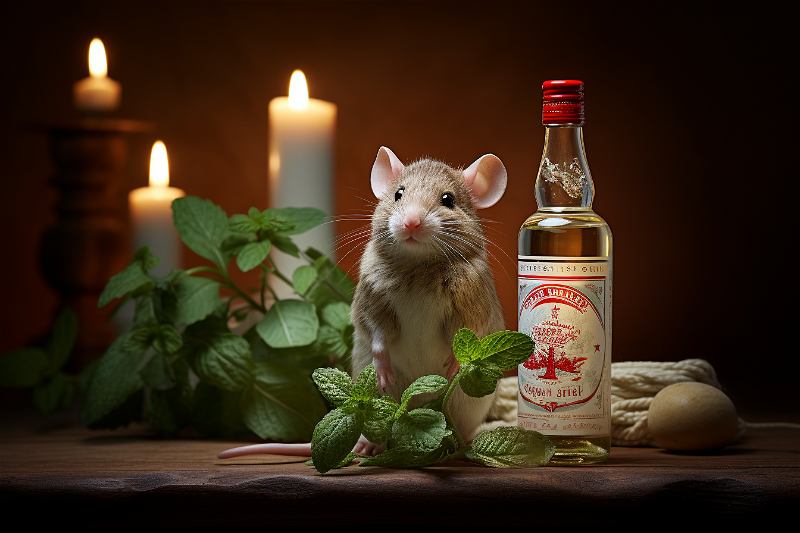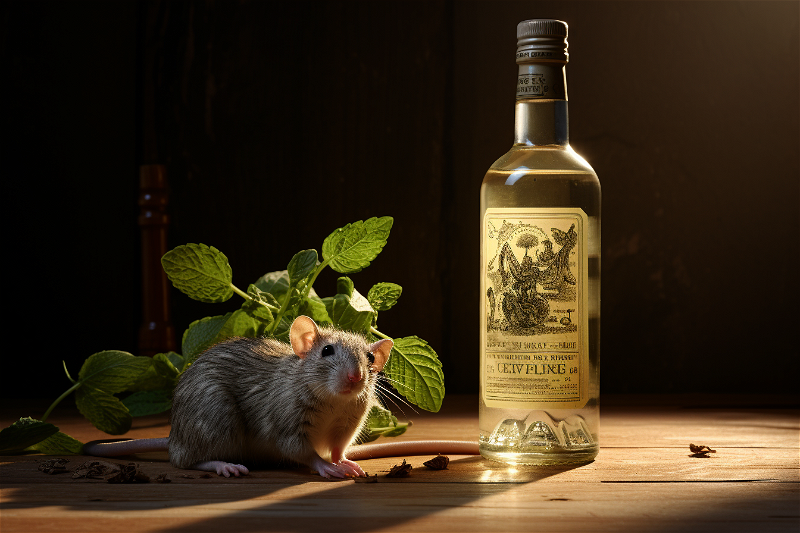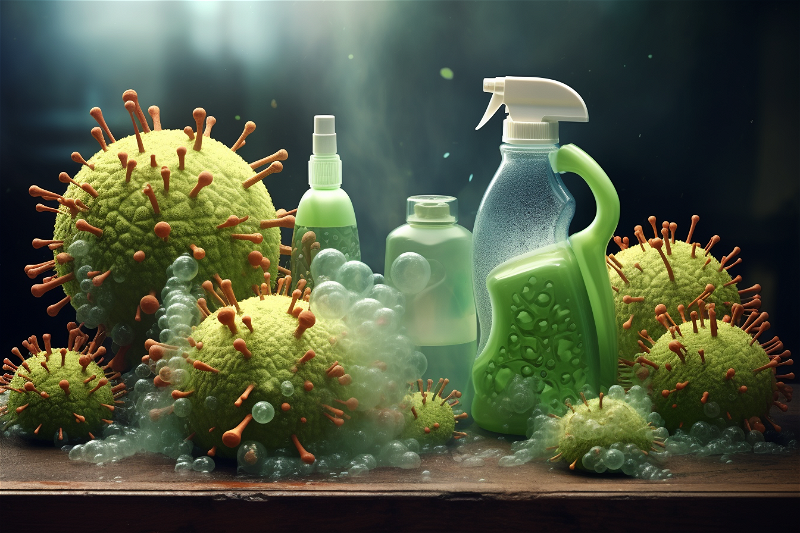Pest infestations are a common nuisance that many homeowners and gardeners face. From ants invading the kitchen to mosquitoes buzzing around the backyard, pests can disrupt our daily lives and cause damage to our property. Traditionally, chemical pesticides have been the go-to solution for pest control. However, concerns about their environmental impact and potential health risks have led to a growing interest in natural alternatives.
Natural remedies have gained popularity as people seek safer and eco-friendly options for pest control. Among these remedies, peppermint oil has emerged as a promising solution. Peppermint oil is derived from the leaves of the peppermint plant (Mentha piperita) and has a strong, refreshing aroma. It is known for its many therapeutic properties, including its ability to repel pests effectively.
Peppermint oil can be an effective and natural solution for controlling pests in households and gardens. In this article, we will explore the use of peppermint oil as a pest control method. We will delve into the properties of peppermint oil that make it an effective repellent, discuss the common pests it can control, and provide practical tips on how to apply it for maximum effectiveness. By understanding the benefits and limitations of using peppermint oil, readers will be empowered to integrate this natural remedy into their pest control strategies.
Understanding Peppermint Oil
Peppermint oil is derived from the peppermint plant, which is a hybrid of watermint and spearmint. It contains a high concentration of menthol, a natural compound responsible for its distinctive scent and cooling sensation. Peppermint oil possesses various properties that make it a potent pest repellent. It is antimicrobial, antifungal, and rich in volatile compounds that insects find repulsive.
Peppermint oil works as a pest repellent through its strong scent and the presence of menthol. The intense aroma of peppermint oil overwhelms the olfactory senses of pests, making the environment inhospitable for them. Insects and rodents have a highly developed sense of smell, and the potent scent of peppermint oil disrupts their ability to detect food sources and communicate with each other.
One of the significant advantages of using peppermint oil for pest control is its safety and non-toxic nature. Unlike chemical pesticides, which can pose risks to human health and the environment, peppermint oil is considered safe for use around children and pets. It does not leave harmful residues on surfaces or contaminate the air. Additionally, peppermint oil is a natural and sustainable resource, further enhancing its appeal as an eco-friendly pest control option.
By harnessing the power of peppermint oil, individuals can take a proactive and environmentally conscious approach to pest control. In the following sections, we will explore the pests commonly repelled by peppermint oil, the various application methods, and additional tips for effective pest management.

Common Pests Controlled by Peppermint Oil
Peppermint oil has shown effectiveness in repelling a wide range of pests commonly found in households and gardens. Some of the pests that can be controlled using peppermint oil include ants, spiders, mice, mosquitoes, flies, cockroaches, and even certain types of beetles. These pests are deterred by the strong scent of peppermint oil, which disrupts their behavior and makes the area less attractive for nesting or feeding.
- Ants: Peppermint oil disrupts the ant’s ability to communicate and find food sources, causing them to avoid areas with the scent of peppermint.
- Spiders: The strong scent of peppermint oil repels spiders, as they rely heavily on their sense of smell to navigate and locate prey.
- Mice: Peppermint oil’s potent aroma is known to deter mice, as they dislike the scent and find it overwhelming.
- Mosquitoes: The strong odor of peppermint oil masks the scents that attract mosquitoes, making it harder for them to locate and bite humans.
- Flies: Flies find the smell of peppermint oil unpleasant, deterring them from entering spaces where the oil is present.
- Cockroaches: Peppermint oil disrupts the pheromone trails that cockroaches use to communicate and navigate, causing them to avoid treated areas.
- Beetles: Certain types of beetles, such as carpet beetles, are repelled by the scent of peppermint oil, making it a useful deterrent for protecting fabrics and clothing.
Peppermint oil has been successfully used in various real-life scenarios for pest control. For instance, homeowners have reported reduced ant trails and decreased spider activity by applying peppermint oil spray around entry points and corners of their homes. Additionally, peppermint oil-soaked cotton balls placed in cabinets and pantry areas have helped deter mice and cockroaches. Gardeners have also used peppermint oil-infused candles or diffusers to repel mosquitoes and flies during outdoor gatherings.
Methods of Application
Peppermint oil can be applied using various methods to effectively repel pests:
- Creating a peppermint oil spray: Dilute peppermint oil with water and add a small amount of liquid soap to create a spray. This can be used to target specific areas or surfaces where pests are present.
- Peppermint oil spray:
- Mix 10-15 drops of peppermint oil with one cup of water.
- Add a small amount (a few drops) of liquid soap to help the oil and water blend.
- Pour the mixture into a spray bottle and shake well.
- Spray the solution along entry points, windowsills, baseboards, or any areas where pests are present.
- Peppermint oil spray:
- Soaking cotton balls with peppermint oil: Place cotton balls soaked in peppermint oil in areas where pests commonly gather, such as cabinets, windowsills, or garden corners.
- Soaked cotton balls:
- Place several cotton balls in a bowl.
- Add 5-10 drops of peppermint oil to the bowl and allow the cotton balls to absorb the oil.
- Put the soaked cotton balls in areas where pests are a problem, such as cabinets, closets, or near openings where pests may enter.
- Soaked cotton balls:
- Using peppermint oil-infused products: Utilize peppermint oil-infused candles, diffusers, or pest control products available in the market to release a continuous scent and repel pests.
- Peppermint oil-infused products:
- Purchase peppermint oil-infused candles, diffusers, or pest control products from a reputable source.
- Follow the manufacturer’s instructions to use these products effectively.
- Peppermint oil-infused products:
Tips for maximizing the effectiveness of peppermint oil applications
- Reapply the peppermint oil treatments regularly to maintain the scent’s potency.
- Focus on areas where pests are most likely to enter or gather, such as doors, windows, cracks, and crevices.
- Combine peppermint oil application with good sanitation practices to eliminate attractants and create an inhospitable environment for pests.
- Experiment with the concentration of peppermint oil to find the optimal level that effectively repels pests without overwhelming the surroundings.
By utilizing these application methods and tips, individuals can harness the power of peppermint oil to control pests effectively and create a pest-free environment in their homes and gardens.
Benefits and Limitations
Advantages of using peppermint oil for pest control
- Natural and environmentally friendly: Peppermint oil is derived from natural plant sources, making it a safer alternative to chemical pesticides. It does not leave harmful residues in the environment or contribute to pollution.
- Pleasant aroma and potential additional benefits: Peppermint oil has a refreshing scent that can help mask odors and create a more pleasant living environment. Additionally, the aroma of peppermint oil is known to have potential therapeutic benefits, such as promoting relaxation and improving mood.
- Safe for use around children and pets: Unlike chemical pesticides, which may pose health risks to children and pets, peppermint oil is considered safe when used as directed. It provides peace of mind for families with young children or animals in the household.
Limitations and considerations when using peppermint oil
- Temporary nature of the repellent effect: Peppermint oil’s effectiveness as a repellent is temporary, and its scent may dissipate over time. Regular reapplication is necessary to maintain its efficacy.
- Need for regular reapplication: Peppermint oil’s volatile compounds evaporate over time, reducing its potency as a repellent. To ensure continued effectiveness, it is important to reapply peppermint oil treatments regularly, especially in high-traffic areas or during peak pest seasons.
- Individual variations in effectiveness: The effectiveness of peppermint oil as a pest repellent may vary depending on factors such as the severity of the infestation, the specific pest species, and the environmental conditions. While many individuals have reported success with peppermint oil, results may vary from case to case.

Additional Tips for Pest Control
Peppermint oil can be used in conjunction with other pest control strategies to enhance its effectiveness. Combining peppermint oil treatments with good sanitation practices, such as regular cleaning, sealing entry points, and removing food sources, can create a comprehensive approach to pest management. Additionally, integrating peppermint oil with other natural remedies or mechanical traps specific to certain pests can provide a multi-faceted approach to pest control.
A crucial aspect of effective pest control is maintaining a clean and unappealing environment for pests. Regularly clean surfaces, remove food debris, and store food items in airtight containers. Eliminate standing water sources and repair any leaks or moisture issues to discourage pests from seeking shelter or breeding grounds.
While peppermint oil can be a valuable tool in controlling pests, some infestations may require professional assistance. If a pest problem persists or becomes overwhelming despite using peppermint oil and other methods, it is advisable to consult a pest control professional who can assess the situation and provide targeted solutions.
By considering these additional tips and integrating peppermint oil with other pest control practices, individuals can optimize their efforts in managing pests and creating a pest-resistant living environment.
Remember, the use of peppermint oil for pest control should be approached with realistic expectations and a willingness to adapt strategies based on the specific pest and circumstances.
Conclusion
Peppermint oil has emerged as a promising natural solution for pest control in households and gardens. Its strong scent and potent properties make it an effective repellent for a range of pests, including ants, spiders, mice, mosquitoes, and more. By utilizing peppermint oil, individuals can take proactive steps towards managing pest infestations and creating a pest-free environment.
Peppermint oil offers several advantages over traditional chemical pesticides. It is derived from natural plant sources, making it a safer and more environmentally friendly option. Peppermint oil is non-toxic, safe for use around children and pets, and does not leave harmful residues or contribute to pollution. It provides a natural alternative for those seeking effective pest control without compromising their health or the well-being of the ecosystem.
If you’re facing pest problems in your home or garden, consider incorporating peppermint oil into your pest control strategy. Experiment with different application methods, such as creating peppermint oil sprays or using soaked cotton balls, to repel pests effectively. Remember to reapply treatments regularly to maintain its effectiveness.
Peppermint oil not only helps in controlling pests but also provides additional benefits such as a refreshing aroma and potential therapeutic effects. However, it is important to acknowledge that while peppermint oil can be a valuable tool, individual results may vary, and some situations may require professional assistance.
By embracing peppermint oil as a natural pest control solution and combining it with good sanitation practices and other pest management techniques, you can create a harmonious living environment that is inhospitable to pests. Take a step towards a safer, eco-friendly, and pest-free home by harnessing the power of peppermint oil.






